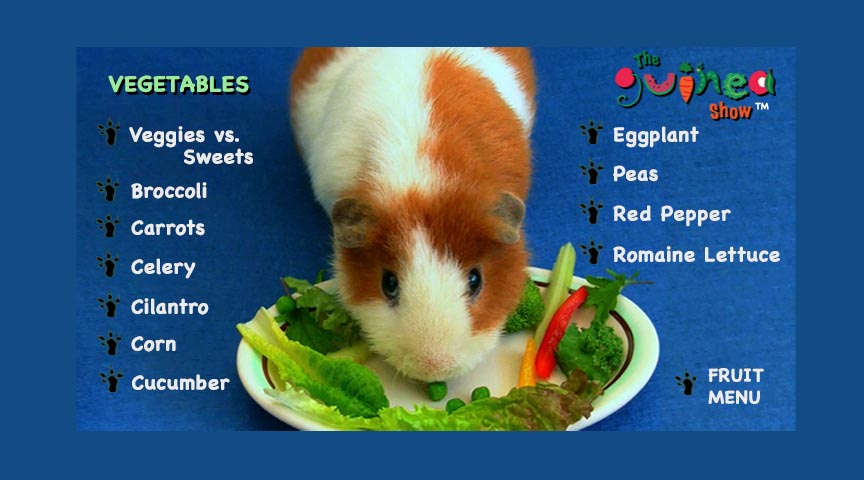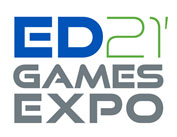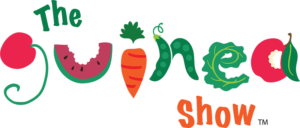The Guinea Show – More Info & Ed Games
On this page, you can find:
- What is The Guinea Show?
- Short Videos – The Guinea Show
- Reviews of The Guinea Show
- Field test results
- How to use The Guinea Show
- USDA Small Business Innovation Research Award
What is The Guinea Show?
The Guinea Show is an innovative, unique, easy-to-use health promotion program that inspires young children to eat more fruits and vegetables (FV). It is an age-appropriate, enjoyable resource to promote FV and reach a critical group of children ages 2 – 7.
Young children are known to form parasocial relationships (attachment and friendship) with media characters over time. Guinea, a cute guinea pig who enthusiastically consumes FV, is the star of The Guinea Show. Guinea embodies excitement about vegetables and fruit, eating nutritious FV with vigor. Genuine, safe, and delightful, Guinea becomes a likable and credible role model and messenger of information for young children about the positive—and delicious—benefits of healthy food choices. In each short, yet powerful video, Guinea inspires children to develop a more positive attitude toward FV and a willingness to try them.
The Guinea Show features short, entertaining videos that celebrate particular fruits and vegetables. After watching a video, children engage in a brief discussion or activity led by the teacher to reinforce and celebrate the fruit or vegetable of the day. The discussion may draw on the experiences of peers and family role models. The program takes 10 – 15 minutes of class time each day.
Teachers will have a quick, fun resource that effectively teaches healthy choices in a way that children enjoy. The Guinea Show videos are a resource for helping young children with reading / early literacy and teaching health and science. The Guinea Show (TGS) may also help reduce food waste by increasing the appeal and desirability of FV.
TGS program is founded on multiple influences from health education, psychology, nutrition, music, imagery, and early literacy techniques. Children learn by observation, role models, and engagement. Twenty-four (24) videos (under two minutes each) are available.
Why is it important for children to eat vegetables and fruit?
Fruit and vegetables (FV) are important for children’s health, growth and development. Yet, most children do not eat enough vegetables, and a majority eat fewer fruits than recommended. Helping young children develop healthier eating habits early by eating FV will help prevent childhood obesity and numerous other chronic diseases.
Getting young kids to eat and enjoy fruits and vegetables as they develop their eating habits is an important strategy for a healthy life.
Publication about The Guinea Show
“A Unique, Innovative, Easy-to-Use Program to Improve Young Children’s Attitudes About and Consumption of Fruits and Vegetables“
American Journal of Lifestyle Medicine, September 27, 2019
Article abstract
Getting children to eat fruits and vegetables (FV) is an important strategy for the prevention of childhood obesity. However, efforts to increase access to FV have also resulted in many of the vegetables and fruits being wasted, leaving children without the nutritional benefits and the resources not achieving their full desired impact. Multidisciplinary influences have shaped a new program for children ages 2 to 7 that can increase the desirability of and consumption of FV.
The Guinea Show is easy-to-use, entertaining, and low cost and features an innovative role model. Results from field tests of The Guinea Show in preschool classrooms are included and indicate that children are more likely to try FV. Brief instructions on how to use this method are described.
Videos for Kids – The Guinea Show
Reviews of The Guinea Show
The realization, “If Guinea likes it, we like it too!” has made our lunch time
a wonderful time of food discovery for young timid eaters. Hooray!!Thank you, Katalina for creating your innovative program. It is a great way for very young eaters to gain
Naomi K., Preschool Director, Ke Aloha Ho’okahi Preschool
exposure to healthy nutrition. Don’t stop now, we want more of the Guinea Show! We eagerly await
your next video!
—————————————————–
… based upon my Early Childhood background…, substantial teaching experiences with young children… The Guinea Show is a high quality teaching tool that is well-planned.
… would certainly draw the interest and imagination of children while naturally capturing their attention to details about the food choices made by the charming living breathing main character of the show. Information about nutrition and the importance of thinking about and choosing healthy foods is given simply, clearly and at appropriate developmental level.
By including a visual, auditory, 5-senses approach, demonstration, observation and discussion to invite thinking, the DVD, the sample lessons, and opportunities for comparing food choices made by guinea pig with actual and possible choices open to children helps guide children to positive attitudes and an understanding that they are able to make good choices of their own. This integrates health and science learning, it is a powerful teaching tool.
Luz, M.Ed., retired Early Childhood Educator for 43 years, at Head Start, K – grade 3, and supervisor of student teachers.
Field test results
An early version of The Guinea Show (TGS) was field tested. The key themes derived from the field test follow:
Theme 1: Children liked The Guinea Show
A teacher said, “They really like watching the guinea pig eat. They loved him.” “The children wanted to watch more videos.” They could have watched it all morning. ” “The children liked the music. “It is a catchy tune as we hear children singing it.”
Theme 2: Some children tried new fruits and vegetables after watching a video of Guinea eating them.
The children and their teachers talked about Guinea during meal times and the fruit and vegetables (FV) being served. Children noticed and were pleased when they ate what Guinea ate. The teachers said TGS encouraged children to try new FV and eat them, stating “I think the children will try new fruits/vegs if they see Guinea eats it.”
One teacher said the children in her classroom all year just licked the cream cheese off of the celery. “A lot of them haven’t touched the celery, and then when we showed the Guinea eating the celery… OK, let me have a small bite.” Some of the children were willing to try the celery for the first time all year and some discovered that they liked it.
Children would discuss that Guinea ate the foods that were served to them at school. “Oh, Do you remember when Guinea ate that? Didn’t he really like it?” “Children are saying, ‘OK.’ Then, they’ll try it.”
Theme 3: It was a helpful resource to teach health and nutrition to young children.
“It would be a great addition to our unit on healthy foods as it introduces one fruit or vegetable at a time.” It tells how FV are important to the body and health.
Theme 4: Teachers found it easy to use.
A teacher said “I liked that it was short and to the point.” “All we did was pop it in and play it. And they were sitting right there with their attention.” Some made special efforts to coordinate the video to match what was being served that day.
How to use The Guinea Show
- Select one fruit or vegetable video to celebrate each day.
For the first few days, select a fruit or vegetable that children usually like, such as apple, banana, or carrot.
Match a food that children will be served that day or teach them about another fruit or vegetable. - Play the one show as many times as you like to celebrate the fruit or vegetable of the day!
- After the video, ask the children a question or engage them with a short activity that focuses on the fruit or vegetable of the day. One question already appears at the end of the video.
For questions or activity ideas see The Parent and Teacher Guide. Fun activities to supplement The Guinea Show.
Access to the videos
How to Access Streaming Membership to 24 The Guinea Show videos and other content for two years: sign up here →https://guineashow.com/shop/streaming-2yr/
After you sign up for the Streaming Membership, to view your content:
- click on My Account at the top of the page,
- then click My Memberships,
- then click View on items listed under My Membership Content.
USDA Small Business Innovation Research award
United States Department of Agriculture (USDA) National Institute of Food and Agriculture (NIFA) Small Business Innovation Research (SBIR) award funding is supporting an evaluation research study in preschools of the effectiveness of The Guinea Show.



